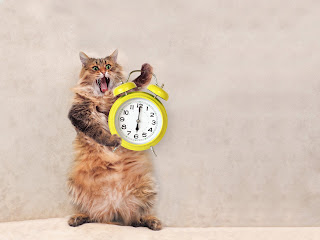 |
| Don't wear your regular "uniform"!😅 |
1. How to Dress:
Dress for a conference in business casual. You want to be relaxed, but yoga clothing isn't the right outfit for this event.Conferences are packed with long
days and exciting classes and sessions. You’ll want to feel comfortable,
confident, and professional. Sometimes rooms are hot and sometimes they’re over
air-conditioned, so be dressed for all options. Specifically, I like to wear casual dress pants
or even a nice pair of jeans and a shirt/blouse that I feel good in, plus I
bring a light jacket or sweater. If you didn’t break the bank paying for the
conference, buy yourself something cute, so you can add to your confidence
quotient!
2. Question Two: What three things I wish I knew before going
to my first conference:
- Make Authentic Connections: Do investigative
homework on people with whom you'd like to connect (the faculty), so you
can have authentic conversations—that means something deeper than
"please love my work". For example, you may research the faculty
on the internet and find out that Mr. Blue loves yoga and so do you—Awesome!
There’s a connection! Mrs. Green grew up on Mars and so did you—Bingo!
Another connection. Mrs. Orange’s favorite show is "My Cat from
Hell" and what? So is yours! The faculty members are humans
(shocker, right 😊), and at conference events where everyone wants a piece of them, they
are craving real conversation. It's nice for both you and them. Plus, when
you follow up with a query, it makes it easy for that faculty member to
remember you. You’ll open your letter with a reminder, “Dear Mrs. Green. It
was fun meeting you at XYZ conference and discovering we both attended
Rocket Middle School on Mars.”
- Be prepared with questions: If you've signed up for a one-on-one critique, go into it like a business meeting rather than a hope for an offer of representation. That sort of hope leaves you nervous and jittery, so instead, approach the meeting like you would with anyone else who you’d hire to consult. THAT MEANS show up prepared with a list of questions about your work—for example, questions I’ve asked in the past (since I write kid-lit) included "Can these words be used in a middle grade novel?" and "Is this skewing middle grade or young adult?" or "Am I achieving the inciting incident quickly enough?" or questions on voice or plot points or "Can you recommend any comparable titles?" For me, it helps to know which current books my project would be shelved next to; for you it might be which books you could look at as mentor texts. Other questions could include, "What do you recommend as next steps" and—the biggie—"Would you be interested in seeing more?" Why not go for that question—but save it for last so it doesn’t mess with your brain. It’s okay if they say no.
- Remind Yourself: a “Pass” from an individual is
not a Rejection from the Entire Industry Every
book is not everyone’s cup of tea. J.K. Rowling’s Harry Potter was rejected by 12 publishers before it was
picked up. Kwame Alexander’s book, The Crossover,
was shopped for almost seven years before it was published. It ended up
winning the Newbery Award and easily became a New York Times Bestseller!
Bruce Cameron’s novel, A
Dog’s Purpose, was rejected by one publisher after the next
because the year before, Marley and Me
was released, and so since Marley
and Me was a smashing success, publishers thought they couldn’t
compete. Publishers rejected A Dog’s
Purpose with a note saying it was “too similar”—but then a new and naïve
assistant editor found the manuscript in the slush pile and championed it
to publication. The novel soared to the top of the New York Times
Bestseller’s list. So there you have it. A “pass” from one person is not a
rejection from the entire publishing industry. You must be diligent in
reminding yourself that taste is subjective. The PARADOX: it’s also
important to listen to what the critiquer has to say. They are industry
professions and have solid and sound advice—it’s why you sign up for a
one-on-one critique. Here is the guidance I received from two brilliant
ladies, Anna-Maria Crum and Hilari Bell: If one unbiased critiquer gives
you advice, you can consider it and then keep it or toss it if the advice
speaks to you; if two unbiased critiquers who are not speaking to one
another give you the same advice, you must seriously consider; if three
unbiased critiquers who are not speaking to one another give you the same
advice, you must make the change in your manuscript.
- Come Prepared: Buy a special notebook and pens/markers—I’m a paper nerd and love doing this before a conference! Bring these items to your critique and write down key points. You think you'll remember what you're critiquer says, but the time flies by and you'll wish you took notes. I promise! Also, take notes during conference sessions—your brain is going to tell you that everything you hear is so life-changing that of course you'll remember it, but trust me when I say you won’t! Not only do I take notes at every conference, but I took fantastic notes at my first event and still enjoy referring back to those tidbits today.
- CONFESSION—And why I give you this advice: I didn’t take notes at my first one-on-one critique, because I was so star struck and hopeful that the editor would want to publish my manuscript. I stayed in a daze the entire critique time, and so I didn't walk away with ways to improve my manuscript. Prepare for your critique like you would any business meeting. Accept that it is highly unusual for an offer to be made on the spot—not because your writing and projects isn’t brilliant, but because so much more goes into an agent’s decision to represent than just the single project.
- More on Agents: Finding
the right agent/author (or agent/illustrator) relationship is critical,
because essentially, it’s a life-long match. As such, the agent needs to
vet you and it’s important that you vet them. The vetting process can be like
dating, both parties are considering the working relationship and an offer
of representation is the marriage proposal. New authors tend to want “someone—anyone”
to get their work out there, but you should consider that agents come in
all forms. Take time at a conference to meet and talk to agents to
discover their style and determine if that is the right style for you. For
example, some agents are editorial and they'll work to help you edit the
manuscript prior to submitting to publishers—I personally wanted and
needed that kind of agent (shout out and mad-love for my agent, Jen Rofé!). Some agents are not editorial—that works better for many of my
friends. Some agents are new and energetic but have not fully established
their reputation. How do you feel about that? Some agents have HUGE names
because they have major clients. You’ll need to decide if that’s important
to you. As a newbie, if you land with that type of agent, it might mean
you end up as their lowest priority, or it might mean the agent has tons
of experience and big-time clout and can take you and your work far (I’ve
seen both happen to authors). For me, as I attended conferences and
met agents or listened to them on agent panels, I discovered who would be
right for me and who would be a horrible match.
3. Have I participated in seminars/intensives
offered at conferences, and what seminar/intensive was the most helpful?
YES! I’ve participated in a few after-conference intensives
(usually a three-hour seminar) and I’ve chosen different ones led by all levels
of professionals—agents, editors, and authors. For me, the most useful intensives
have been the author-led workshops. What is best for you depends on what stage
you’re at in your writing and publishing process. Early in my process, I
attended a three-hour roundtable where participants read the first five pages
of their manuscript and received instant feedback from the agent. That was
extremely informative —not because of the feedback I received on my work, but
because hearing feedback on fifteen different projects helped me grow my own
writing. At that point in my writing career, I found it easier to discover or
recognize mistakes when it didn’t feel personal, and then I used that knowledge
to fix my own writing problems. Another seminar I attended was “How to do
School Visits” with Suzanne Morgan Williams and Bruce Hale—Wow! That was fantastic
and so helpful since The
11:11 Wish was due to release soon, and I had no idea how to handle school
visits. Another workshop I attended was with award-winning author Linda Sue
Parks. It truly helped me dig into my work and improve my craft. My favorite thing about seminars/intensives
is how they small and personal feeling, since they are usually limited to a
small handful of participants.

Practice with people. Practice with strangers. Practice with your barista. Say, “I’m
writing a book, can I tell you about it?” And then be prepared to talk for thirty
seconds, saying something substantial that will hook the listener’s interest. It’s
tough. You write a 50,000 word manuscript, and then you need to be able to cull
it down to something meaningful and with meat in a few short sentences. The
book Save the Cat by
Blake Snyder has an entire section about pitches. Read it! He says to read
current movie pitches and he says pitching to strangers while you’re in line at
a coffee shop or grocery store can be your best gauge of true interest. It can
also help you become less nervous when it really matters. If you practice your
pitch to a stranger and their eyes glaze over, you’re not ready, but nothing is
lost. If you say it and the person asks you questions, awesome! You’ve captured
their interest. I might get this quote wrong, but Andrea Brown, founder of the
Andrea Brown Literary Agency, likes to say a pitch should be like a skirt: long
enough to cover everything, but short enough to keep it interesting. Keep the listener
engaged and curious. For fiction, I love to start crafting my pitch with the Save the Cat formula: On the
verge of a Stasis=Death moment, a flawed protagonist Breaks into Two; but when the Midpoint happens, he/she must learn the
Theme Stated, before All Is Lost.
5. Is there anything
else?
Yes! Read the faculty members’ work (their books, their
clients’ books) prior to attending a conference. Here’s my article on WHY this
is so important: http://kimscritiquingcorner.blogspot.com/2016/07/top-five-reasons-reading-prepares-you.html
Carry a water bottle, bring healthy snacks to keep your energy up, and
treat yourself with kind words, a grateful heart, and believe you are deserving of good things
to come!












1 comment:
Excellent, in-depth and relevant info. Kim for conference attendees, whether never-evers or old hands (like me... and emphasis on the old). Especially liked the part about asking the agent or editor in the meeting for comp titles, for the author's own research. If I can add something, if the author has already done their research and found good comp titles, mentioning them to the agent or editor can elevate your professionalism and show your consideration for the manuscript's market potential. Thanks!
Post a Comment